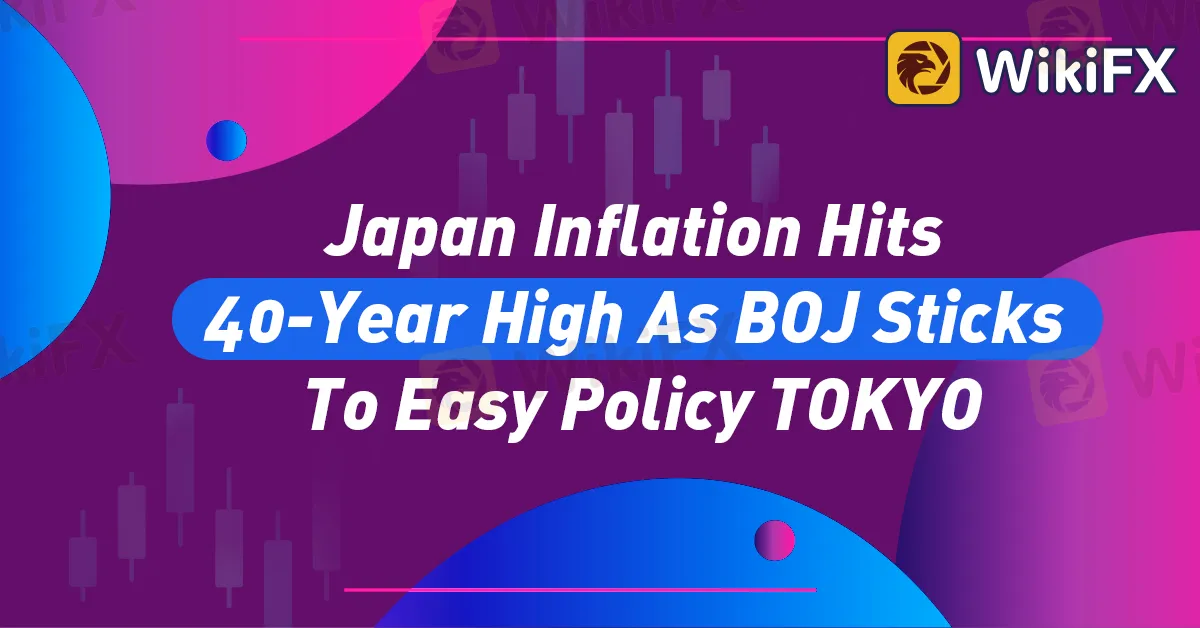简体中文
繁體中文
English
Pусский
日本語
ภาษาไทย
Tiếng Việt
Bahasa Indonesia
Español
हिन्दी
Filippiiniläinen
Français
Deutsch
Português
Türkçe
한국어
العربية
Japan Inflation Hits 40-Year High As BOJ Sticks To Easy Policy TOKYO
Abstract:Japan’s inflation hit its fastest clip in 40 years in October, an outcome that further stretches the credibility of the central bank’s view that continued stimulus is needed to secure stable price growth. The national core consumer price index (CPI) rose 3.6% a year earlier, exceeding the 3.5% gain economists had hoped for and the 3.0% rise seen in September.

Japan‘s inflation hit its fastest clip in 40 years in October, an outcome that further stretches the credibility of the central bank’s view that continued stimulus is needed to secure stable price growth. The national core consumer price index (CPI) rose 3.6% a year earlier, exceeding the 3.5% gain economists had hoped for and the 3.0% rise seen in September.
Consumer prices excluding fresh food climbed 3.6% in October from a year ago, the internal affairs ministry said Friday. It was the biggest jump since February 1982, when the Middle East crisis stemming from the Iran-Iraq war disrupted crude supplies and sparked a spike in energy prices. The rise in the index, which excludes volatile fresh food prices but includes oil products, confirmed that inflation has remained above the Bank of Japan's (BOJ) 2% target for the seventh straight month.
The reading outpaced a 3.5% forecast by analysts and marks the fastest price growth since 1982. Core inflation has now exceeded the Bank of Japan‘s 2% price target for seven straight months, with the yen’s historic fall amplifying the trend. But economists don't expect the BOJ to join the global trend of raising interest rates, seeing this year's acceleration in inflation as a cost-push episode that will fade as import costs stop pushing up.
Foreign supply constraints have pushed up the price of imported food, industrial commodities and manufactured parts, and so has the decline in the yen, which is in dollar terms down more than 20% this year.
“Its getting harder for the BOJ to keep saying that the current cost-push inflation is temporary,” said Mari Iwashita, chief market economist at Daiwa Securities Co. If the yen remains weak, more companies will try to pass on costs to consumers.
“I'm not changing my view that gains will start to slow soon,” said Takeshi Minami, chief economist at the Norinchukin Research Institute, noting the drop in global grain prices. “I expect inflation to peak at the end of the year and price increases to start easing in the new year.”
BOJ Governor Haruhiko Kuroda on Thursday reaffirmed a pledge to maintain monetary stimulus to achieve sustainable and stable wage growth and inflation. The central bank kept long-term interest rates at around zero and short-term rates at minus 0.1%. The economy remains fragile as it recovers from the COVID-19 downturn. Also, Japan's inflation rate remains moderate by the standards of other developed countries.

Disclaimer:
The views in this article only represent the author's personal views, and do not constitute investment advice on this platform. This platform does not guarantee the accuracy, completeness and timeliness of the information in the article, and will not be liable for any loss caused by the use of or reliance on the information in the article.
Read more

Doo Financial Expands Reach with Indonesian Regulatory Licenses
PT. Doo Financial Futures, a subsidiary of the global financial services brand Doo Group, has secured regulatory approval from Indonesia’s Badan Pengawas Perdagangan Berjangka Komoditi (BAPPEBTI).

Investment Scams in Malaysia: Telegram Tops Scammers’ List
In the first 11 months of 2024, Malaysia recorded 5,685 investment scams, with Telegram emerging as the most commonly used platform for fraudulent activities.

WikiFX Review: Is IQ Option trustworthy?
IQ Option is catching our eye as it seems to be a trending topic. For those who want to know whether IQ Option is a reliable broker, WikiFX made this article to help you better understand this broker.

5 Questions to Ask Yourself Before Taking a Trade
Before executing any trade, traders should pause and ask themselves critical questions to ensure they are making rational and well-informed decisions. Here are five questions to help you reflect on your strategy, manage risk, and control emotions before entering the market.
WikiFX Broker
Latest News
Geopolitical Events: What They Are & Their Impact?
Volkswagen agrees deal to avoid Germany plant closures
Top 10 Trading Indicators Every Forex Trader Should Know
TradingView Launches Liquidity Analysis Tool DEX Screener
MultiBank Group Wins Big at Traders Fair Hong Kong 2024
WikiEXPO Global Expert Interview: Simone Martin—— Exploring Financial Regulation Change
'Young investors make investment decisions impulsively to keep up with current trends' FCA Reveals
Why Do You Feel Scared During Trade Execution?
CySEC Settles Compliance Case with Fxview Operator Charlgate Ltd
Malaysian Influencer Detained in Taiwan Over Alleged Role in Fraud Scheme
Currency Calculator


